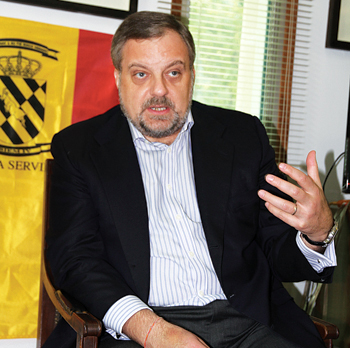We are very much in favour of 'Make in India': Spanish Ambassador Gustavo de Aristegui
The Ambassador of Spain in India, Gustavo de Aristegui in an interaction with Mr. Jayant Baranwal, Editor-in-Chief of SP's AirBuz explains how Spain has in the last about four years deepened ties with India and looks forward to strengthening the relationship based on trust and benefits.


Jayant Baranwal (Baranwal): Could you tell us about the civil aviation conference which you attended in New Delhi recently?
Gustavo de Aristegui (Ambassador): The conference was surprisingly good. There were some Interesting details about the booming market that aviation is going to be in India. You see that there are less than 350 jets operating in the country which is so huge. You see crowded airports and they say less than one per cent of Indians are flying, just imagine what is going to happen when two per cent of Indians are flying or five per cent of Indians are flying or 10 per cent of Indians flying. It is going to be a crowded sky. The predictions that some of them are making that there would 1700 or 1800 jets in the next 10 20 years, I believe it would be more.
Right now, we as part of Airbus Spain are proud that it is one of the biggest, if not the biggest market in the world. Airbus has the largest market share of any other market in the world. It is a remarkable achievement.
Baranwal: What do you think of the recent record breaking order of IndiGo of 250 Airbus A320 neo aircraft making a total of 530 aircraft A320 within a limited span of time?
Ambassador: I know it is difficult business and that the volatility of the markets, the volatility of the price of fuel and oil is affecting the profitability and the stability of the business. It is obvious. But in this environment it is very amazing to see such brilliant executives as most Indian airlines have. In many aspects they have created trends... for example in negotiation. Indigo is not just about buying planes at a reasonable price, negotiating well with the manufacturers of aircraft or manufacturers of engines. It is about financial engineering, it is about their management, it is about their structure cost, it is about their personnel management, their human resources and it is really quite amazing. I can tell you that I have flown in all Indian carriers, absolutely all of them and I like all of them.
Baranwal: What are the reasons for you to like them?
Ambassador: Everyone has specificity. For example, Indigo is very efficient and very much on time and its' personnel are warm. I like the formula of GoAir with these two front rows and an empty seat in the middle. I like it a lot. Goair is really one of my favourites. I like the new Spicejet. I have a great deal of respect for Ajay Singh, the CEO of SpiceJet. During the Nepal crisis we had over 700 Spaniards stranded in Nepal. We ended up evacuating 350 and the vast majority of them through Delhi, mostly on commercial flights. We had a concentration of about 300 Spaniards on the night of 26th April in the facilities of San Jose, a Spanish company that is refurbishing and enlarging the airport of Kathmandu. We were not getting permission to land our government jet in Kathmandu and the Indian Foreign Minister Mrs. Sushma Swaraj who was hosting the Spanish foreign minister that night gave me the contact of Ajay Singh. They were operating normally from Kathmandu and they were operating with commendable spirit of service. We were able to take out 40 Spaniards and on other Spicejet flights also several dozen Spanish nationals were evacuated and it was thanks to his generosity and his humane vision of the crisis.
He was permanently on call, day and night and on whatsapp and on telephone and he always kept his word. His team was efficient and his team was good. I have to say a lot of airlines were not able to fly in and out of Kathmandu in the first 72 hours, four or five days of the tragedy, but they kept on flying, probably they were one of them flying normally. The rates were also absolutely normal and they gave free food on board. They were doing that for humanitarian reasons and I thought it was a beautiful gesture.
Baranwal: Could you tell us about your views on India's aggressive 'Make in India' initiative?
Ambassador: We are very much in favour of 'Make in India' and we have told our interlocutors many times that. We have gone through similar phases in Spain. In yesteryears, we used to buy hardware from other countries, United States among others, we used to build somebody else's designs, today we do the whole thing on our own.
Baranwal: You mentioned that you used to import for a long time, how much did it take for you to have a totally 'Make in Spain' industry?
Ambassador: We still buy from abroad. You cannot produce everything. Nobody does, not even the United States. It took may be about 30 years to get to super top notch high tech industry. I think India will take lot less than that.
Baranwal: Why do you think India may take less time to have its own aersopace and defence industry?
Ambassador: Indian companies are producing components for Boeing and for Airbus already, from very sophisticated parts of the fuselage, to discs for the brake, the wheels for a plane and we are not talking of a disc of a truck or a tractor. We are talking about a disc to stop a Boeing 777 or an Airbus A330 . India has some very interesting aerospace companies. You are already there on so many fronts. The period for the indigenous aerospace industry in India is not a matter of time and in so many aspects it is already there.
Baranwal: Could you tell us about Spain's strength in Civil aviation?
Ambassador: We are very happy with our conversations with the Ministry of Civil Aviation. We are certain that in my talks with Indian officials of the ministry of external affairs and so many other ministries I have seen that in the last three and half years, there has been a greater proximity of both countries in so many aspects and deeper ones. It is really in aspects that pertain to technology cooperation, industrial cooperation, investment cooperation and many other fields. Indian authorities have noticed that Spain is a world player in a lot of aspects that have not been taken into account before. We are the sixth largest industrial defence country in the world, just after the five permanent members of the Security Council. The sixth largest producer and exporter of defence technology is Spain, bigger than Germany, Italy, Israel, South Africa and Brazil.
The two flagships of the Australian Navy are Spanish designed and built. The state of the art frigates of the Norwegian navy is Spanish design and built. The flagship of Thai navy is Spanish design and production. The C295 is in 21 air forces and that is phenomenal.
Baranwal: Could you tell us about partnership between India and Spain in civil aviation?
Ambassador: Civil aviation is very important thing because it is going to boost the relation of two countries. We were exploring the possibility direct flight between Madrid, Barcelona and New Delhi with Air India. It is on the table. I have a conversation pending with new Air India Chairman. On the other hand, Iberia is out of the red and in black. They are linking Madrid with each and every capital of Latin America. You name the city, Iberia goes there. The hub cooperation between India and Spain to link India to Latin America is without doubt Madrid. The shortest and most efficient way is through Madrid or Barcelona without any doubt. So we have to work on that.
Baranwal: How does the hub cooperation work?
Ambassador: For example some hubs in Europe that are not well connected with Latin America are seeing a growth in traffic between India and Latin America of about 30 per cent which is enormous. I am talking about cities which are not connected to Latin America. Just imagine if those flights were redirected through Madrid, what the growth would be on those flights, it would be crazy. And there are some countries where India has enormous interests such as in Mexico, Peru, Chile, Argentina and Brazil, although these places have direct flights from Madrid and other cities. Right now civil aviation cooperation is going to be a super star in our bilateral relations.
Baranwal: Spanish company Indra has market leadership in civil aviation, could you talk a little bit Indra?
Ambassador: Yes, it has 90 per cent market share. Indra is the biggest player in air traffic controls systems. Indra is the biggest in that sector in the world, even in Germany they have overwhelming share and in Europe it is 60 per cent in the United States it is 35 per cent. It think it is extremely interesting to have cooperation in this field. Spain has some of the most advanced systems of air traffic control, some of the most advanced civilian radars and systems. It is absolutely amazing to see Indra is the world's leader in this field.
Baranwal: Any expectation from the Indian civil aviation policy
Ambassador: India has enormous potential in tourism as I said in my speech yesterday. You have beautiful landscapes, every climate under the sun, breathtaking historic monuments, birth place of so many religions, you are one of those countries people to love to come, you have one of the five most well known monuments in the world the Taj Mahal. About 70 per cent of Himalayas is in Indian territory and I am saying India has to become aviation friendly.
India has upgraded airports, lot of them are new, but they have already become small. The new Goa airport is already crowded. Look at Trivandrum, they could not close the old one because the new one was small. The low cost goes to the old airport while the regular carriers go to the new one. Air travel has a great future in the country and that Indians are going to be moving to II, III and IV cities, also by aircraft. In smaller airports they are going to be flying turboprops. One of my aims is to bring a Spanish company, right now there is none to connect points of tourism as attractive as Rajasthan by a circular flight. The connection can be Jaipur to Udaipur to Jodhpur to Jaisalmer, so that people who want to fly these places don't have to come to Delhi or drive for eight hours. It will be absolutely great and it will boost tourism there and do exactly the same in other places like that in India
Baranwal: Is there any specific solution for that in Spain?
Ambassador: I spoke to the Chief Minister (Rajasthan) about this because I see a lot of potential. The Canary islands of Spain which is seven islands are linked by two or three Spanish private airlines and one of them is Binter. They efficiently cover the islands with constant flights among them. It works very well. It has boosted tourism in the islands. They are operating ATRs, C295 that kind of aircraft.





